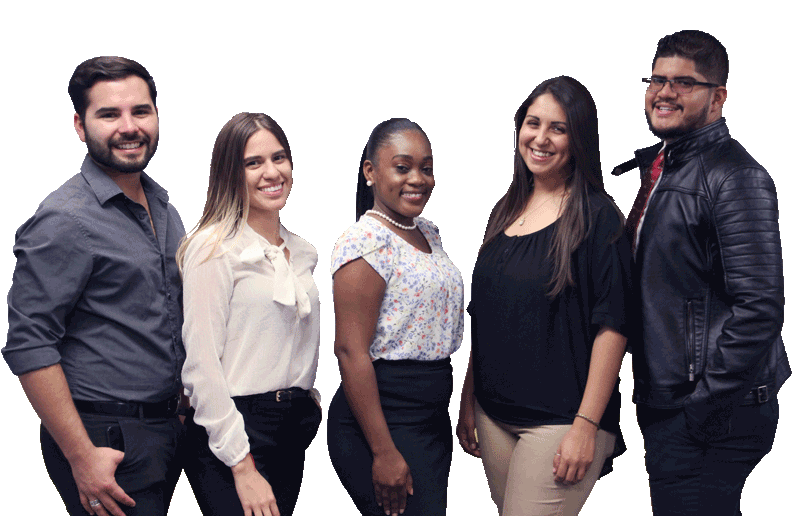The Doctorate in Human Services at Albizu University (AU), Miami Campus, prepares students to become culturally competent and socially responsible PhD professionals who excel as advocates, scholars, and leaders in their community that serve and empower marginalized and underserved populations.
PhD in Human Services
Students enter the program with master’s degrees in disciplines that include mental health, psychology, education, social work, sociology, speech and language pathology, pastoral counseling, anthropology, nursing, public health, and criminal justice, among others. In each of these fields, public and private institutions assist physically or emotionally challenged individuals at every stage of life due to age, poverty, abuse, disability, immigrant or minority status, illness, addiction, imprisonment, or violence.
Students enrolled in the Doctorate in Human Services program acquire scholarly knowledge based on state-of-the-art research findings, a solid grounding in leadership, nonprofit organization management, and the ability to influence current policies and laws governing the field of human services.
- Students become prepared to select a general curriculum or a specialization for a leadership role in serving individuals in need, their families, and their communities by building proficiency in the following areas: conflict resolution, gerontology, children and families, and neurolearning.
The Doctorate in Human Services program’s general curriculum provides instruction on:
- Mediating conflicting situations, handling crises in a culturally sensitive and ethical manner, and attending human resources matters.
- Developing or expanding research programs, seeking and obtaining funding, and analyzing and interpreting policies, rules, regulations, and laws.
- Understanding profit and nonprofit organizations’ administrative roles and proceedings, emphasizing executive leadership and strategic planning, and leading others in the human services field.
- Developing or expanding specific research areas of interest in research as well as writing proposals for grants to seek and obtain funding.
The program's specializations include the general areas described above, except two additional courses covering:
- Development and policy principles in the conflict resolution specialization.
- Conflict mediation and human resources management in the gerontology, children and families, and neurolearning specializations. Those courses are substituted for specialization courses.
The four PhD specializations are summarized as follows:
- The Conflict Resolution Specialization provides the additional skills and strategies needed to become an effective local and international negotiator, peacemaker, and agent of change.
- The Gerontology Specialization highlights successful aging as well as specific strategies and services to help older adults better cope with biological, personality, social, and cognitive changes.
- The Children and Families Specialization focuses on the role of advocacy in addressing pressing issues faced by youth at risk and their families in their community, as well as on skills and abilities that enhance protective efforts.
- The Neurolearning specialization reviews the neuroscience foundations of learning, cognition, and emotion in both the normal and pathological brain, offering a practical approach to identify and treat neurodevelopmental variations.
Available in the following locations:
Program Details
Credits
69 credits
Academic Level
Doctoral degree
Duration
4 years
Request Information

Program Director:
Rafael Martinez, EdD.
Director, Ph.D. Program in Human Services Miami
(305) 593-1223 ext. 3319
[email protected]
2173 NW 99th Ave
Miami, FL 33172-2209
Program Highlights
- Students receive both theoretical knowledge and practical experiences to become ethical administrators and researchers skilled in conflict mediation, executive leadership, non-profit organization and human resources management, grant proposal writing, and test development.
- Students in AU master’s programs are welcome to apply to this doctoral program.
- Students can expect to enhance their professional development beyond the knowledge they have gained during their master’s degree studies and create new avenues of research. Students will be enriched by and learn in a multi-disciplinary setting, as their peers will come from a variety of human services professions.
In Focus
- This program is offered online and in a hybrid modality.
- Before graduation, students must submit at least one article for publication to a scientific journal. Once they graduate, they can work as administrative service managers; education administrators; and as post-secondary, social and community service managers.
- All faculty members hold doctoral degrees in human services areas.
Choosing the right university matters.

- A completed and signed application form submitted prior to the established deadline and accompanied by the $50 application fee. Begin the application process by setting up an online account.
- Results of the Graduate Record Examination (GRE). Only the scores from exams taken within the last five years will be accepted.
- Official transcripts from all previous undergraduate and graduate (if applicable) institutions attended, showing that the following conditions
have been met:- A master’s degree in mental health, education, social work, sociology, speech and language pathology, pastoral counseling, anthropology, nursing, public health, criminal justice, or any other human service-related field.
- A graduate GPA of 3.0 or higher.
- Official transcripts including any degree(s) received. A bachelor’s degree from an accredited institution of higher education in the United States is required.
- Applicants enrolled in institutions of higher education outside the United States whose standards of training are substantially equivalent to the standards of training of those institutions in the United States will also be considered.
- Two (2) letters of recommendation—at least one of which should be from current or past professors and the other may be from a supervisor—submitted either as letters evaluating the applicant’s academic performance, clinical or field experience, and research experience (in accordance with the AU format).
- A current curriculum vitae that summarizes the applicant’s credentials.
- A statement of purpose, which should be double-spaced, typed, and two to three pages long. It must articulate short- and long-term career goals.
- Proof of appropriate immigration status for all international students. International students should also submit an official evaluation of
academic credentials by an authorized agency. The credentials must include the applicants' GPA. For detailed information on this requirement, please refer to the International Students’ Credential Evaluation Services section of the Albizu University website. All admission credentials for international students must be received by Albizu University at least 90 days prior to the beginning of the session of expected enrollment.
Once the Admissions Office receives all the required documentation and the interview process is completed, academic program advisors will contact successful candidates to provide program direction and guidance.
Albizu University is accredited by the Middle States Commission on Higher Education (MSCHE) and licensed by the Commission for Independent Education of the Florida Department of Education.
Join our student community!
